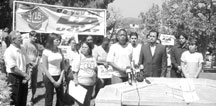CHARLENEM

LOS ANGELES (FinalCall.com) – State Senator Richard Alarcon, along with an alliance of lawmakers, community leaders, educators and students, demanded at a September 1 press conference that the University of California at Los Angeles (UCLA) revamp its student admissions policies toward more diversity.
Sen. Alarcon stated that UCLA is a public institution–therefore, the taxes paid by the local community that provide the opportunity for it to exist must be returned in terms of an investment in local students.
“Nobody here is saying that we should reduce the standards. Nobody is saying that we should give special consideration to these students. What I am saying is that these students are already eligible, already meet the criteria, but UCLA is not giving them the opportunity,” he stated.
The “You Don’t See LA At UCLA” platform is part of Sen. Alarcon’s push for UCLA to guarantee admissions to Los Angeles students, from all ethnic backgrounds, who excel within the top four percent of their classes, and live within a 15-mile radius of the Westwood campus (4/15+ campaign).
He stated that the plan is not preferential, nor does it change the UCLA admission standards. Rather, it merely holds the school accountable to a 1998 state agreement under former Governor Gray Davis, guaranteeing the top four percentile students entrance to the college system. Sen. Alarcon continued that the agreement did not specify any particular school; however, UCLA and UC-Berkeley have had the poorest admissions records for eligible Black and Latino learners.
Sen. Alarcon also stated that UCLA should evaluate students comprehensively for their talents and contributions, as it did with its Black athletic population. He added that 25 to 30 percent Black athletes were admitted to UCLA, and if it could recognize those talents, it is questionable why it cannot recognize the talents of 3.8 students from high crime and poverty area schools like Locke and Compton High Schools.
“They rely far too heavily on GPA and SAT scores,” he contended. “I believe that’s important, but I also believe that success in our country relies heavily on public relations skills–relies heavily on organizational skills and those things can’t be measured by the SAT. Civic responsibility cannot be measured by the GPA. You need to take a look at the student for the work that they’ve done in their community.”
According to Sen. Alarcon, Chancellor Carnesale promised decades ago to rectify the color code at UCLA, but has not taken concrete action over the last five years. Senate Select Committee on College and University Admissions and Outreach 2004 data reflects that admissions for Black students ran a steady decline.
Last year, nearly 3,000 of 12,261 Caucasian undergraduate applicants received passes, compared to 277 out of 1,900 Black students, and 2000 out of 6,000 Chicano/Latino students. Grad student and former student body president Anica McKesey was surrounded by students wearing yellow and blue “4/15+” t-shirts and holding “Do You See LA at UCLA?” signs. Her five-year studies at UCLA began in 1999, along with approximately 700 other students of African descent, but she is distressed by the less than 100 Black enrollees today.
“We understand the numerous ways that the community invests in UCLA through workers, our taxes and being a public land bearing institution, but what we’re failing to see is how UCLA is reinvesting back in the community by admitting the high school seniors that are in the L.A. community currently,” she stated.
Following his media address in front of Kerkhoff Hall, Sen. Alarcon and supporters marched to the Chancellor’s office to present over 1,000 community petition letters, racked with statistics and questions about UCLA’s admission disparities, and in support of “4/15+.”
They were met by Executive Vice Chancellor Daniel Newman, who read a prepared statement citing UCLA’s commitment to student diversity.
Groups in support of “4/15+ for Success” include the L.A. Chapter of the National Association for the Advancement of Colored People (NAACP), Families in Schools, African American Parent/Community Coalitions for Educational Equality, Inc., First A.M.E. Church and the Muslim Student Association.












